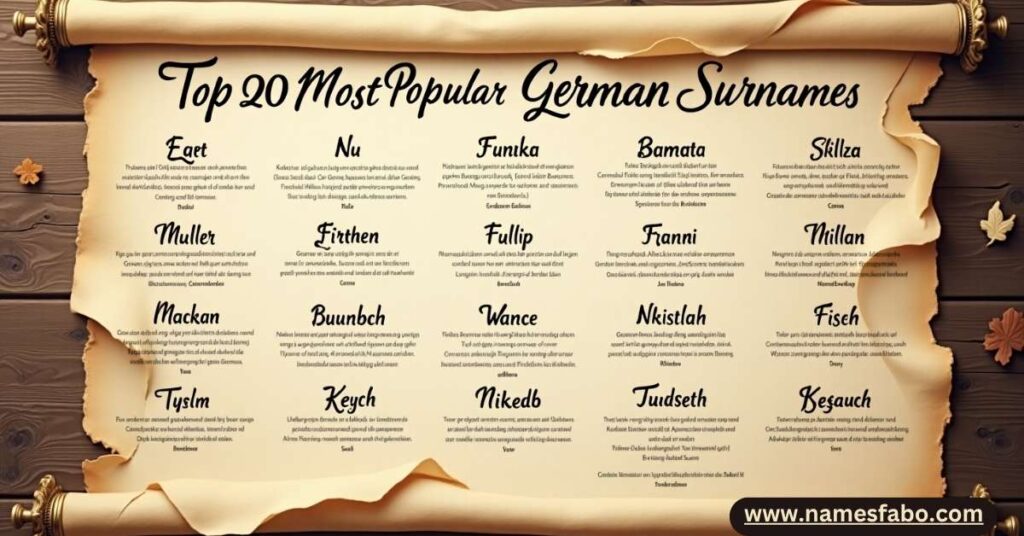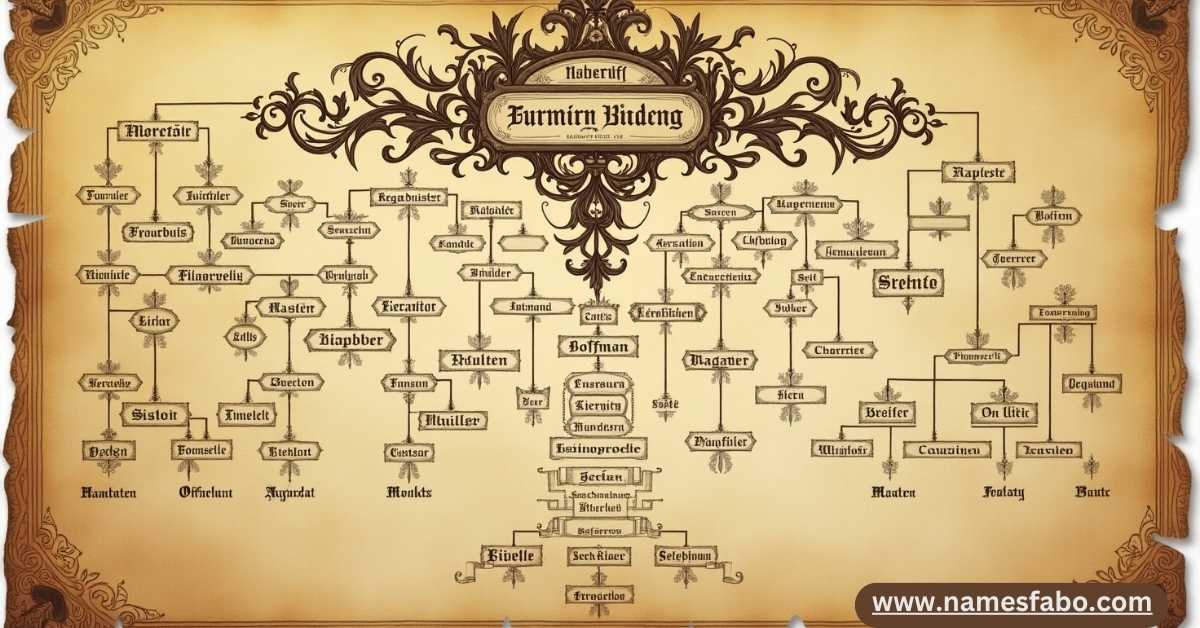Over 40 million Americans claim German heritage, yet most don’t know their surname’s fascinating story. German last names carry centuries of history, revealing medieval professions, geographic origins, and family traits. Whether you’re researching your ancestral German names or simply curious about Germanic language surnames, this comprehensive guide unlocks the secrets behind Germany’s most intriguing family names.
Key Takeaways
German surnames origin dates back to medieval times when families needed permanent identifiers for taxation and land ownership. Traditional German surnames reveal four main categories: occupational, geographical, patronymic, and descriptive names. Some rare German surnames exist in fewer than 100 families worldwide, making them precious links to ancient German culture.
The Origin of German Last Names
German last names didn’t appear overnight. They evolved during the 12th to 16th centuries when the Holy Roman Empire needed better record-keeping systems. Medieval German surnames emerged from practical necessity – governments needed to track citizens for taxes, military service, and property ownership.
German genealogy records show that most surnames fell into clear categories. Occupational names dominated because medieval society revolved around specialized crafts and trades. German occupational last names like Schmidt (blacksmith) and Müller (miller) became incredibly common because these professions existed in every village.
Germanic people surnames also influenced modern naming patterns. Ancient Saxon, Frankish, and Bavarian tribal identities shaped regional naming customs that persist today. Surname distribution Germany still reflects these historical tribal boundaries, with certain names clustering in specific regions.
The German surname database reveals fascinating patterns. Northern Germany favored different naming conventions than Bavaria or Austria. Swiss-German last names and Austrian-German surnames developed their own unique characteristics while maintaining Germanic roots.
Popular German Last Names and Their Meanings

Common German last names today reflect the medieval economy’s backbone professions. These top German last names 2025 represent families whose ancestors shaped German society through skilled craftsmanship and essential services.
Germanic language surnames carry deep cultural significance. Each name tells a story about medieval life, revealing how families earned their living and where they came from. German surname etymology shows how language evolved alongside society, preserving ancient words in modern family names.
- Schmidt – blacksmith, metalworker
- Müller – miller, grain processor
- Weber – weaver, textile craftsman
- Fischer – fisherman, water tradesman
- Bauer – farmer, agricultural worker
- Wagner – wagon maker, transportation specialist
- Becker – baker, bread maker
- Schulz – village mayor, local leader
- Hoffmann – court official, estate manager
- Koch – cook, kitchen professional
Meaning of German last names often surprises people. Names that sound peculiar to English speakers usually describe common medieval occupations. German last names and their symbolism reflect a society where professional identity determined family status.
Most Common German Last Names
List of common German last names reveals Germany’s medieval economic foundation. Surname popularity ranking shows occupational names dominating the top positions because every community needed these essential services.
Top surnames in Germany today haven’t changed dramatically in centuries. The same names that topped medieval guild registers still appear most frequently in modern German surname database searches. Popular surname prefixes Germany like “von” indicate noble heritage, while common endings reveal regional origins.
Surname distribution Germany shows interesting patterns. Berlin last names differ from popular Bavarian last names because regional economies emphasized different trades. North German last names often relate to maritime activities, while surnames from German regions in the south focus on agriculture and mountain trades.
High-ranking surnames in Germany today include:
- Müller – miller (most common)
- Schmidt – blacksmith
- Schneider – tailor
- Fischer – fisherman
- Weber – weaver
- Meyer – farm manager
- Wagner – wagon maker
- Becker – baker
- Schulz – village head
- Hoffmann – court official
Surname origins Deutschland research shows these names appearing in records across all German regions, making them truly national surnames.
Read More About : Last Names: 1,000 + Most Common in the U.S. |2025|
100 Top German Surnames
German surname clusters reveal fascinating regional patterns. This comprehensive family name database Germany represents extensive research through telephone directories, immigration records, and historical German name registry archives.
Surname spelling variations Germany create challenges for genealogists. Names like Schmidt appear as Schmitt, Schmid, and Smyth in different regions. Phonetic variations in German last names occurred when families moved between dialect areas or emigrated to other countries.
| Rank | Surname | Meaning | Category | Regional Popularity |
| 1 | Müller | Miller | Occupational | National |
| 2 | Schmidt | Blacksmith | Occupational | National |
| 3 | Schneider | Tailor | Occupational | National |
| 4 | Fischer | Fisherman | Occupational | Northern/Coastal |
| 5 | Weber | Weaver | Occupational | National |
| 6 | Meyer | Farm Manager | Occupational | Northern |
| 7 | Wagner | Wagon Maker | Occupational | National |
| 8 | Becker | Baker | Occupational | National |
| 9 | Schulz | Village Head | Occupational | National |
| 10 | Hoffmann | Court Official | Occupational | National |
| 11 | Schäfer | Shepherd | Occupational | Rural |
| 12 | Koch | Cook | Occupational | National |
| 13 | Bauer | Farmer | Occupational | Rural |
| 14 | Richter | Judge | Occupational | National |
| 15 | Klein | Small | Descriptive | National |
| 16 | Wolf | Wolf | Descriptive | National |
| 17 | Schröder | Tailor | Occupational | Northern |
| 18 | Neumann | New Man | Descriptive | National |
| 19 | Schwarz | Black | Descriptive | National |
| 20 | Zimmermann | Carpenter | Occupational | National |
Surnames related to professions in Germany dominate this list because medieval society relied heavily on skilled craftspeople. German surnames tied to nature and names derived from animals Germany appear less frequently but carry powerful symbolic meanings.
Cultural German last names reflect the values medieval Germans prized: craftsmanship, reliability, and community service. Surname lineage Germany research shows these professional names passing down through generations, creating lasting family identities.
Old German Last Names and Their Medieval Roots

Ancient Germanic names preserve linguistic treasures from Europe’s distant past. German surname roots trace back to tribal societies where names reflected personal characteristics, clan affiliations, or legendary achievements.
Teutonic surnames carry the weight of ancient warrior cultures. These surnames from German nobility often incorporate elements meaning strength, battle, or leadership. Medieval German surnames list includes names that survived from pre-Christian Germanic societies.
Germanic individuals surnames varied by region and tribal affiliation. Saxon names differed from Frankish or Bavarian patterns. Saxon family names often emphasized agricultural or warrior traits, while German tribal surnames from mountain regions focused on geographic features.
- Adalbert – noble brightness
- Bernhard – brave bear
- Dietrich – people’s ruler
- Eckhart – sword point
- Friedrich – peaceful ruler
- Gottfried – God’s peace
- Heinrich – home ruler
- Konrad – brave counselor
- Leopold – people’s bold
- Siegfried – victory peace
- Theodoric – people’s ruler
- Walther – army ruler
- Wilhelm – will helmet
- Wolfram – wolf raven
- Albrecht – noble bright
Old-fashioned German names like these carried deep spiritual and cultural significance. Surnames in German folklore preserve ancient stories about legendary heroes and mythical creatures.
A Unique List of German Last Names
Unique German family names represent rare linguistic gems surviving from medieval times. These rare German last names 2025 exist in small populations, making them precious connections to specific historical communities or specialized professions.
Genealogy-friendly German surnames help researchers trace family connections because their rarity makes them easier to track through historical records. Rare family names in German heritage often indicate families with unusual occupations or geographic origins.
Creative last names from Germany sometimes resulted from medieval humor or unusual circumstances. Surname analyzer Germany tools help modern families understand these unique names’ fascinating origins.
- Kummerspeck – grief fat (stress eating)
- Verschlimmbessern – to make worse by improving
- Sattlerthwaite – saddle maker’s clearing
- Gerberding – tanner’s descendant
- Böttcher – barrel maker
- Drechsler – wood turner
- Fassbinder – barrel binder
- Goldschmidt – goldsmith
- Hufschmied – horseshoe smith
- Instrumentenmacher – instrument maker
- Kürschner – furrier
- Lebkuchen – gingerbread maker
- Messingschmied – brass smith
- Nadelspitze – needle point
- Pergamentmacher – parchment maker
Surnames with deep meanings Germany often surprise people with their complexity. These rare German surnames preserve specialized medieval professions that disappeared centuries ago.
Read More : Russian Last Names : A Detailed Guide in 2025
Funny German Last Names
Funny German family names aren’t actually funny to Germans – they’re dignified family identities with serious historical meanings. What sounds amusing to English speakers often describes respectable medieval professions or personal characteristics.
Germanic last names and identity remain sources of family pride regardless of how they sound in other languages. Cultural significance of surnames Germany emphasizes respect for ancestral heritage over modern linguistic humor.
Understanding funny German last names requires cultural sensitivity and historical context. These names earned respect in medieval communities where they described essential services or admirable traits.
- Kummerspeck – comfort food (literally “grief fat”)
- Schmutz – dirt, grime
- Stinky – smelly (occupational: perfumer)
- Würst – sausage maker
- Bier – beer brewer
- Käse – cheese maker
- Speck – bacon curer
- Knödel – dumpling maker
- Sauerkraut – pickled cabbage maker
- Pumpernickel – dark bread baker
German surnames used in America sometimes got anglicized to avoid pronunciation difficulties. Surnames with meanings in English translation often lose their original cultural dignity and historical importance.
Cool German Last Names with Deep Meanings
Cool German last names combine linguistic beauty with powerful historical significance. These surnames that mean moon in German or reference natural forces carry mystical appeal for modern families seeking meaningful connections to their heritage.
German last names that mean strength appeal to people wanting surnames that convey power and determination. Spiritual German last names connect families to ancient beliefs about nature, courage, and divine protection.
Surnames linked to strength or courage dominated medieval naming because physical and moral courage were highly valued traits. Masculine sounding German last names often incorporate elements meaning iron, stone, or battle.
- Eisenhut – iron guard
- Steinhart – stone hard
- Donnerschlag – thunder strike
- Sturmwind – storm wind
- Felsenstein – rock stone
- Kraftmann – strength man
- Mondschein – moonshine
- Sternberg – star mountain
- Himmelsstern – heaven star
- Morgenstern – morning star
- Adlerherz – eagle heart
- Löwenherz – lion heart
- Bärenstark – bear strong
- Wolfskraft – wolf strength
- Drachentöter – dragon slayer
German last names for RPG characters frequently draw from these powerful traditional names. Surnames for German RPG characters and surnames for fictional German characters use these elements to create authentic-sounding fantasy names.
Famous German Surnames (With English Translations)
Famous German last names list includes celebrities, politicians, and historical figures who’ve made these names internationally recognizable. Last names in Germany carry cultural weight beyond their original meanings.
German last names used in America gained prominence through successful immigrants who maintained their ancestral names. Anglo-Germanic surnames show how German names adapted to English-speaking countries while preserving their essential character.
Nobility-inspired German last names appear frequently among successful modern figures, suggesting these names carry positive associations with achievement and reliability.
- Einstein – one stone (Albert Einstein, physicist)
- Beethoven – beet farm (Ludwig van Beethoven, composer)
- Gutenberg – good mountain (Johannes Gutenberg, printer)
- Diesel – people (Rudolf Diesel, engineer)
- Fahrenheit – traveling (Gabriel Fahrenheit, physicist)
- Röntgen – clearing (Wilhelm Röntgen, physicist)
- Gauss – goose (Carl Friedrich Gauss, mathematician)
- Kepler – hat maker (Johannes Kepler, astronomer)
- Merkel – landmark (Angela Merkel, chancellor)
- Schwarzenegger – black plowman (Arnold Schwarzenegger, actor)
Translation of German last names helps Americans understand the humble origins of now-famous surnames. Modern surname evolution Germany shows how names gain prestige through their bearers’ achievements.
German Last Names That Mean Moon, Strength, or Nature

Last names from German mythology and surnames that signify heritage Germany often incorporate celestial and natural elements. German last names that mean brave or reference natural forces appeal to families seeking meaningful connections to ancestral beliefs.
Surnames related to religion in Germany sometimes blend Christian and pre-Christian elements. German last names based on personality traits reveal what medieval Germans valued most: courage, strength, wisdom, and connection to nature.
Names that show tradition Germany preserve ancient Germanic beliefs about the relationship between humans and natural forces. Surnames with Germanic pride celebrate the cultural heritage that shaped European civilization.
Celestial and Nature Names:
- Mondschein – moonshine
- Silbermond – silver moon
- Vollmond – full moon
- Himmelsstern – heaven star
- Morgenstern – morning star
- Abendstern – evening star
- Sonnenschein – sunshine
- Regenbogen – rainbow
- Schneeflocke – snowflake
- Waldgeist – forest spirit
Strength and Power Names:
- Eisenherz – iron heart
- Steinhart – stone hard
- Kraftvoll – powerful
- Donnerstark – thunder strong
- Bergfest – mountain firm
- Felsenfest – rock firm
- Stahlhart – steel hard
- Löwenmut – lion courage
- Adlerstark – eagle strong
- Bärenkraft – bear strength
Surnames tied to German geography reflect the landscape that shaped German culture. Regional dialect last names Germany preserve local linguistic variations that add richness to the German naming tradition.
Read More About : Spanish Last Names and Meanings: The Ultimate Guide (2025)
German Last Names That Reflect Personality or Profession
Surnames based on German professions dominated medieval naming because professional identity defined social status. German occupational surnames preserve evidence of sophisticated medieval economy with hundreds of specialized trades.
Surnames that start with “Sch” or “K” often indicate occupational origins. Surname suffix patterns Germany reveal regional preferences and linguistic evolution patterns that help genealogists trace family movements.
Surnames by social class Germany show how medieval hierarchy influenced naming patterns. German surnames for family trees research benefits from understanding these social distinctions.
Professional Surnames:
- Goldschmidt – goldsmith
- Silberschmied – silversmith
- Kupferschmied – coppersmith
- Steinmetz – stone mason
- Uhrmacher – clockmaker
- Buchbinder – bookbinder
- Glasmacher – glassmaker
- Instrumentenbauer – instrument maker
- Waffenschmied – weapon smith
- Rüstungsschmied – armor smith
Personality Trait Surnames:
- Lustig – cheerful, merry
- Ernst – serious, earnest
- Klug – clever, smart
- Fleißig – diligent, industrious
- Sanft – gentle, mild
- Wild – wild, untamed
- Ruhig – calm, quiet
- Stark – strong, powerful
- Kühn – bold, daring
- Weise – wise, sage
Surnames for baby naming 2025 increasingly draw from these traditional names as parents seek meaningful alternatives to common modern choices.
German Last Names Based on Locations (Bergmann, Holtz, Stein)
Last names tied to German geography reveal ancient settlement patterns and migration routes. Surnames from German regions help genealogists identify ancestral homelands and trace family movements across centuries.
German surnames tied to nature often describe landscape features that defined community identity. Village-based surnames Germany preserve names of places that may no longer exist, making them valuable historical records.
Surnames by German region show distinct patterns reflecting local geography, economy, and culture. Names by village help researchers pinpoint exact ancestral origins.
Mountain and Hill Names:
- Bergmann – mountain man
- Berger – mountain dweller
- Bergstein – mountain stone
- Hügel – hill dweller
- Felsenberg – rock mountain
- Gipfel – peak, summit
- Talmann – valley man
- Höhenmann – heights man
- Steinberg – stone mountain
- Felsenmann – rock man
Forest and Wood Names:
- Waldmann – forest man
- Holz – wood dweller
- Tannenberg – fir mountain
- Eichenwald – oak forest
- Buchenwald – beech forest
- Fichtenwald – spruce forest
- Kiefernwald – pine forest
- Baumgarten – tree garden
- Hainmann – grove man
- Laubwald – leaf forest
Water Feature Names:
- Bach – stream dweller
- Flussman – river man
- Seebach – lake stream
- Wasserfall – waterfall
- Teichmann – pond man
- Moormann – marsh man
- Quellenmann – spring man
- Uferland – shoreland
- Stromberg – current mountain
- Flußtal – river valley
Surname map Germany research shows these geographic names clustering in regions matching their literal meanings, confirming their authentic origins.
Read More : Japanese Last Names: 1500+ with Deep Meaning & Beauty
How to Trace Your German Ancestry Through Surnames
Surnames for ancestry search provide valuable starting points for genealogical research. Surnames to trace German roots often contain clues about geographic origins, family professions, and migration patterns.
German surnames for genealogy research requires understanding historical context and regional variations. Surname migration Germany to US created additional complexity as names got anglicized or simplified during immigration.
Ancestral last names from Germany appear in various record types: church registers, civil records, military documents, and immigration papers. German genealogy records preservation varies by region and time period.
Research Strategy Steps:
- Document current family knowledge – gather what relatives know
- Identify surname meaning and origin – use German surname databases
- Determine likely German regions – based on surname distribution
- Search German church records – most complete historical source
- Check immigration documents – Ellis Island, ship manifests
- Use DNA testing – correlate with surname geographic patterns
- Contact German archives – for specific regional records
- Join surname societies – connect with other researchers
German-American last names research benefits from understanding 19th century German surnames documentation practices. Surnames used in German emigration periods show specific patterns that help researchers identify departure points.
Surname insight Germany comes from combining multiple research approaches and understanding historical context behind naming patterns.
Interactive List: Which German Last Names Are Familiar to You?
Surname finder Germany tools help people identify connections to German heritage through name recognition. Family surnames by region Germany research shows interesting patterns in American German surname distribution.
Most used surnames in Germany 2025 continue reflecting medieval occupational patterns, but regional variations persist. Common last names in Germany 2025 maintain their historical rankings with minor fluctuations.
Recognition Test – Check Names You Know:
Very Common Names (90%+ Recognition):
- Schmidt – blacksmith
- Müller – miller
- Weber – weaver
- Fischer – fisherman
- Bauer – farmer
- Wagner – wagon maker
- Becker – baker
- Koch – cook
- Richter – judge
- Klein – small
Moderately Common Names (50-90% Recognition):
- Zimmermann – carpenter
- Hoffmann – court official
- Schäfer – shepherd
- Neumann – new man
- Schwarz – black
- Braun – brown
- Lange – long/tall
- Wolf – wolf
- Krüger – potter
- Schulz – village head
Less Common Names (10-50% Recognition):
- Köhler – charcoal maker
- Engel – angel
- Sommer – summer
- Winter – winter
- Vogel – bird
- Stein – stone
- Berg – mountain
- Graf – count
- König – king
- Kaiser – emperor
Naming trends Germany 2025 show increased interest in traditional surnames as families seek stronger connections to their cultural heritage.
Read More About : Chinese Last Names 2025: Ultimate Meanings & Lineage List
Frequently Asked Questions
What is a very German last name?
Schmidt represents the most quintessentially German surname, appearing in virtually every German region throughout history. This occupational surname describes blacksmiths who were essential in every medieval community. Müller (miller) ranks equally German, as grain processing was fundamental to German society.
Very German surnames share certain characteristics: they’re occupational, found nationwide, and maintain consistent spelling across regions. Traditional German family name examples include Weber (weaver), Fischer (fisherman), and Bauer (farmer).
What is a rare German last name?
Rare German surnames 2025 include names like Kummerspeck (grief fat), Verschlimmbessern (to worsen by improving), and Sattlerthwaite (saddle maker’s clearing). Rare family names in German heritage typically describe specialized medieval professions or unusual personal characteristics.
Genealogy-friendly German surnames that are rare include Instrumentenmacher (instrument maker), Pergamentmacher (parchment maker), and Lebkuchenbäcker (gingerbread baker). These unique German family names exist in fewer than 100 families worldwide.
What is a traditional German family name?
Traditional German family name patterns follow medieval guild surnames: Zimmermann (carpenter), Schumacher (shoemaker), Bäcker (baker). Traditional surname patterns Germany emphasize occupational identity because profession determined social status.
German surnames used in nobility include von Habsburg, von Bismarck, and von Goethe. Aristocratic German surnames use “von” (of/from) to indicate noble heritage or land ownership.
What are the goofy German last names?
Funny German family names aren’t actually goofy to Germans – they’re respectable surnames with serious historical meanings. Cute sounding German family names like Kummerspeck describe stress eating, while Würst indicates sausage making expertise.
Cultural German names deserve respect regardless of how they sound in English. Germanic surnames and identity remain sources of family pride, and cultural significance of surnames Germany emphasizes ancestral dignity over modern linguistic humor.
Conclusion
German last names represent living museums of medieval European culture. Each traditional German surname preserves stories about ancestral occupations, geographic origins, and family characteristics that shaped centuries of German society.
German heritage last names continue influencing modern identity as Americans rediscover their ancestral connections. Surname lineage Germany research helps families understand their place in the broader tapestry of German cultural history.
Whether your family carries a common German surname like Schmidt or a rare German surname like Kummerspeck, these names connect you to a rich tradition of craftsmanship, community service, and cultural pride. Germanic language surnames preserve linguistic treasures from Europe’s past while continuing to shape family identities in the present.
German surnames origin research reveals the practical wisdom of medieval naming systems that created lasting family identities. Meaning of German last names extends far beyond literal translations – these names carry the weight of cultural heritage, family pride, and ancestral achievement that continues inspiring modern generations seeking deeper connections to their roots.

Lena Rivers
Content Creator
Lena Rivers, our co-founder and creative soul, combines her love for animals with a flair for fantasy naming. Her unique ability to blend myth and nature results in captivating names that bring magical creatures to life. With a passion for storytelling, Lena adds a touch of wonder to every project she undertakes.

